

Transition advice



Change the Conversation Our General Election campaign





Father and son


Paul and Marc’s story

Summer 2024 YOUR Music, magic
member offers
and
Plus
Planning what happens after school
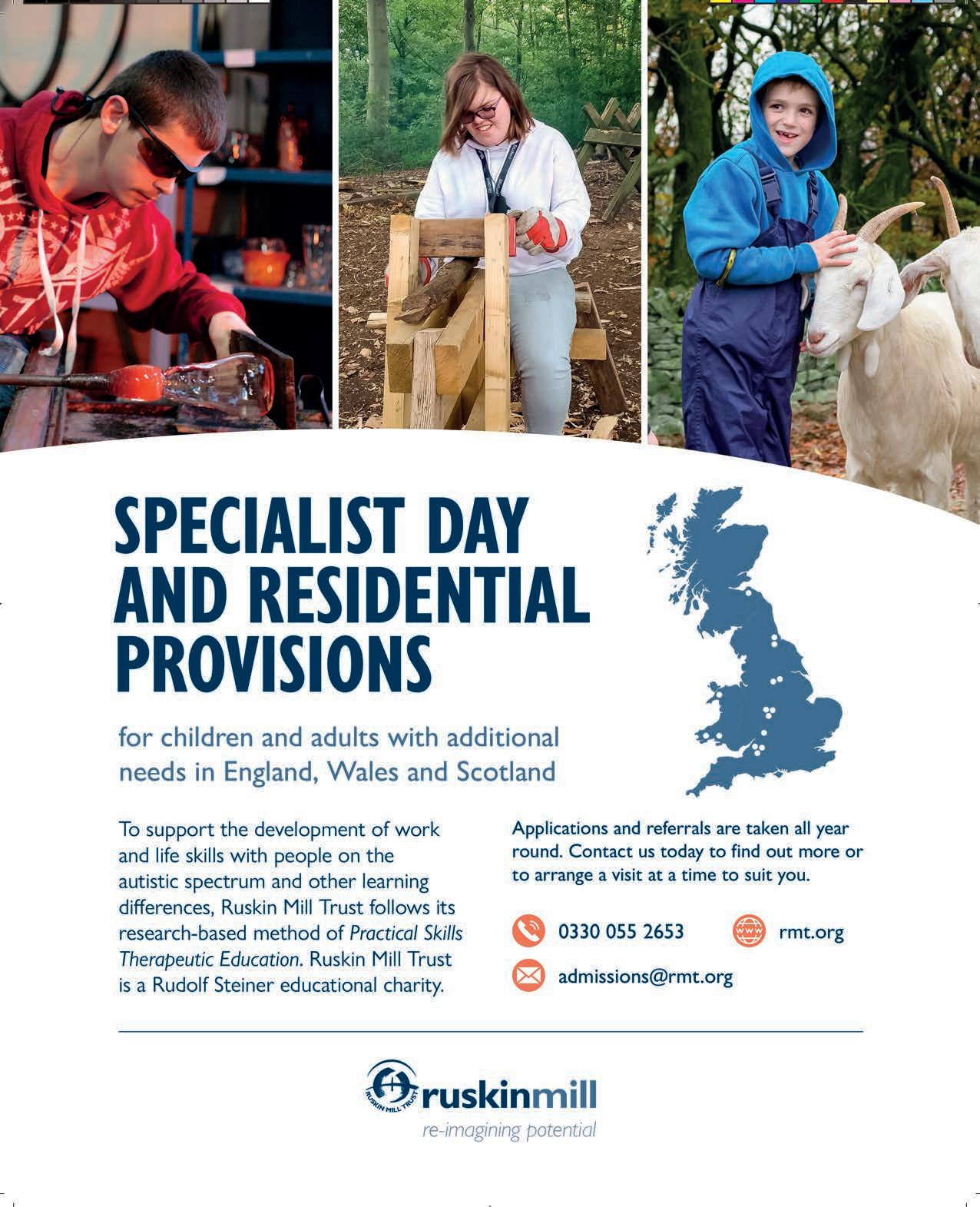

EDITOR
Suzanne Westbury YourAutismMag@nas.org.uk
CONTRIBUTORS
Helen Wilson, Grace Liu
HEAD OFFICE
National Autistic Society
Weston House 42 Curtain Road London EC2A 3NH autism.org.uk
SUPPORTER CARE TEAM
0808 800 1050 membership@nas.org.uk
ADVERTISING
James Pembroke Media
Tel: 0203 859 7098 hoby.abdel@jamespembroke media.co.uk
SUBSCRIPTIONS
Only available to members of the National Autistic Society. To join, visit autism.org.uk
DESIGN AND PRODUCTION
CPL One
01223 378000 cplone.co.uk
1 Cambridge Technopark, Newmarket Road, Cambridge CB5 8PB
PRINT
Warners Midlands 01778 391000
National Autistic Society is a charity registered in England and Wales (269425) and in Scotland (SC039427) and a company limited by guarantee, registered in England (No.1205298), registered office Weston House, 42 Curtain Road, London, EC2A 3NH
© Your Autism magazine Summer Vol 58, No 2
National Autistic Society ISSN 2055-0413
The views expressed in Your Autism and any enclosures or advertisements are not necessarily those of the National Autistic Society. In the interest of providing readers with the widest range of information, we may include details of some of the many approaches to autism. However, this does not imply our charity’s endorsement of any particular approach or product.
The inclusion of a website does not necessarily imply that our charity endorses or supports the group or individuals running the website, nor does the absence of a website imply that our charity does not endorse or support the group or individual running the website.



Contents
What’s new
A round-up of the latest news
My child’s diagnosis
Diagnosing Fiona’s son
Empowering travel
Take part in new research
Father and son
Paul’s fatherhood journey
Our Chelsea garden
Explore our garden design from the RHS Chelsea Flower Show
Music for the soul
Dame Stephanie Shirley explains the benefits of music
Working life
Co-creating magic shows
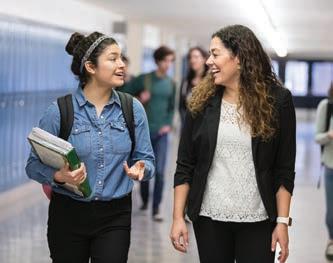










Wired for sound
Creating accessible audio
Readers to the rescue
Asking for social care
Top tips... for enjoying a music festival
Planning a transition from mainstream school
What you need to know
News from our charity
Art at Sybil Elgar School and new web resources
Notebook
Things to read, do and see
Nice to meet you... Eddie writes about his interests
“Travel causes anxiety, missed experiences, meltdowns and exhaustion”
Summer 2024 3
Summer 2024 YOUR 04 08 11 12 16 20 22 26 30 32 34 38 40 42 11 Transitions All in the act 22 34 Making music 20
What’s new?
Our round-up of the latest news and views
Help us Change the Conversation
On 4 July, the UK will elect a new Government and, in the run up, we want to ensure that every political candidate hears directly from autistic people. We know that campaigning can be difficult as an autistic person, but your voice matters and now is a great time to act. That’s why our new campaigner toolkit is designed to help you campaign in a way that works for you. With tips, advice and templates to help you get involved, we’re committed to finding new ways for autistic people to participate in our country’s politics. Whether or not you’ve campaigned with us before, your perspective is invaluable to helping the next Government understand and act on the critical issues affecting you. We’re encouraging you to express yourself however you choose – through recording videos, writing stories, speaking, emailing, or using picture-based systems or technological devices. You can also contact us at campaign@nas.org.uk to help you share your communication needs with candidates in your constituency. Never underestimate the power of your lived experience. Read more and join our 2024 General Election campaign at autism.org. uk/what-we-do/campaign/general-election
















Our manifesto:




● Reform education and teacher training.
● End the diagnosis wait-time crisis.
● End the detention in mental health hospitals scandal.
● Halve the autism employment gap by 2030.
● Introduce mandatory training for public services staff.
Consultation on Personal Independence Payment (PIP)
The Government has released its consultation on changes to Personal Independence Payment (PIP), alongside a Green Paper setting out proposals for reform. It proposes to alter the eligibility criteria for current and future PIP recipients, with the aim of reducing spending on support for people living with disabilities.
Many autistic people depend on PIP to live full and dignified lives. The current system is not suitable for autistic people and needs reform, but a simple cost-
cutting exercise will simply mean autistic people are let down.
We are calling for an appropriately funded benefits system that meets autistic people’s needs. Our in-depth response to the consultation will highlight autistic people’s voices, needs and concerns.
Our policy team has launched a survey to collect autistic people’s experiences of the current PIP system which will be used to inform our consultation response. You can complete the survey at bit.ly/PIP-reforms
4 Your Autism
Get in touch!
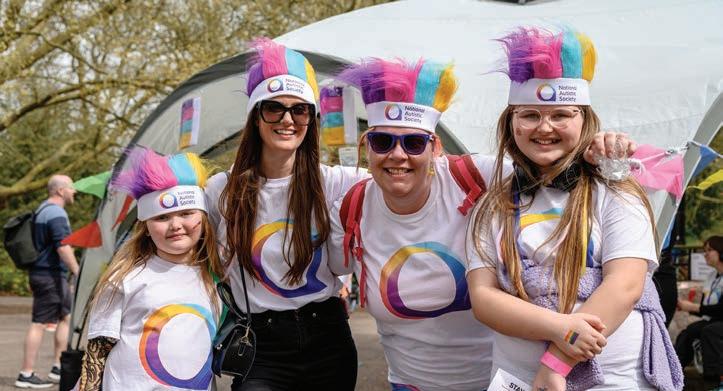
What a week!
Thank you so much for supporting World Autism Acceptance Week and for your amazing fundraising! Our Spectrum Colour Walks in London, Leeds and Birmingham sold out, and we welcomed the most incredible supporters. Our ‘Do Your Own Spectrum Colour Walk’ was embraced by so many families and individuals, as well as our wonderful schools, services, groups and branches. So far, you have raised £302,294 to help us create a society that works for autistic people.

Improving workplaces
A vital part of our charity’s strategy is to help more autistic people access all types of work. Our team has developed a new Employer Award to encourage more businesses to welcome and support autistic employees.
The award provides employers with a robust assessment to identify gaps in support and improve inclusion for autistic staff. With multiple packages available to suit the employer’s size and needs, the award offers tailored training, mentoring and consultancy programmes.
Successful employers will receive our Inclusive Employer Kitemark logo. Most importantly, participating employers will deliver increased awareness and support for autistic employees.
Find out more at autism.org.uk/autism-inclusiveemployer-award
Wellbeing for carers
Autism Central has launched six webinars on looking after yourself as a parent or carer of an autistic person. Themes include the impact of self-critical thinking and what we can do to be more compassionate with ourselves. Find out more at autismcentral.org.uk/balance


Guiding mental health
Our new, free e-learning module, ‘A guide to the mental health experiences and needs of autistic teenagers’, is for parents and professionals supporting autistic young people aged 13-18. It aims to increase understanding of autistic young people’s mental health experiences and explore strategies to support them. Visit autism.org.uk/mentalhealthmodule
Correction
In our Spring 2024 issue, we published an advertisement on page 38 that stated NW Autism & SEND Consultancy offers ‘the only accredited PDA Advocate course available in the UK’. This was incorrect, as The PDA Society and other organisations also offer accredited PDA Advocate courses.
Summer 2024 5 News
Autism Inclusive Employer
Learn to cook – with a discount!
Professional chef Jason Shaw and clinical nutritionist James Ellis have brought their skills together to form Elevated Food For Life – a digital programme that teaches people how to cook healthier meals at home.
The pair met in the schoolyard a few years earlier: James’s twins, Martha and Gracie, and Jason’s son Christian are firm friends. The dads want to be around for their kids for as long as possible, as well as to be role models for the children when it comes to healthy eating.
This was especially interesting to Jason and his wife Caroline, given that Christian is autistic and Type 1 diabetic: they, naturally, wanted him to be as healthy as possible.
The Elevated platform is a bit like a Netflix of healthy recipes sites. Members get access to a catalogue of more than 250 healthy recipes with step-by-step video instruction, as well as new content each month.
Elevated recipes are nutritionally designed to get the absolute best




out of each ingredient while still being tasty and looking great on the plate. As Jason says: “The first bite you take is with your eye.” The recipes are also designed to be cost-effective.
As well as recipes, there are articles on nutrition, skills tips videos to make you a better home cook, and a host of mini courses, including how to time block, meal plan, organise your kitchen and save money on your shop.
Members also get a monthly Ask Us Anything live Q&A session on Facebook, where the pair answer queries around food, cooking and nutrition – the sessions




have even seen James and Jason offer bespoke versions of the recipes based on client requests. Jason and James are offering National Autistic Society members a 50% discount on the price of Elevated membership – and there’s a price freeze promise, too. Your monthly joining rate will never change as long as you remain a member.
To learn how to cook healthier for less than £5 a month, visit elevatedfoodforlife.com/signup and use the code NAS50 at the checkout.
We are delighted to offer National Autistic Society members and their families and friends enhanced access to IBM’s SkillsBuild programme. It provides a wide range of professional training courses at no cost, and the chance to gain industry-recognised certificates to enhance employability. Please register using our unique link ibm.biz/NASIBMSkillsBuild
iStock.com/ Six_Characters 6 Your Autism Member offers
IBM SkillsBuild


“I didn’t
know the first thing about autism”
Fiona shares what led up to her son’s autism diagnosis and how diagnosis day was as liberating as it was daunting

Fiona says diagnosis was like an “unspoken line in the sand”
To my shame, I knew absolutely nothing about autism when I had my first child in 2013. Sure, I knew people whose children were autistic, and I understood, in a distant way, that parts of their lives could be stressful and tiring, but these lives were a million times removed from my own. I had given birth to a baby boy who, in his first year, began to make eye contact, wave and respond to his name.
Fast forward to early 2017, by which time my son had a baby brother. Our eldest had a speech delay, was behaviourally very challenging and increasingly socially isolated, and would spin endlessly with his eyes strained far out to the side for (as I know now) maximum sensory effect. He was delayed in his fine motor skills, watched the same TV and movie clips on repeat, and ran into the freezing cold North Sea without hesitation, fully clothed, whatever the time of year.
But there was always an explanation. He had obstructive sleep apnoea caused by enlarged tonsils and adenoids, meaning he would wake up throughout the night, distressed and gasping for breath – so he was chronically exhausted and had repeated bouts of brutal tonsillitis.
Plus, he was a toddler, a boy, a first born; he was at home with mum all day, not at nursery with peers; it was winter, with all its bugs; it was summer and too hot. There was always a totally feasible explanation, always plenty of reassurance from others that all things would pass. Put simply, I didn’t know the first thing about autism, so was unaware of the array of flags waving in the wind.
It was only post-recovery from the operation to remove his troublesome tonsils, and once the sleep apnoea had stopped,
My child’s diagnosis 8 Your Autism
that the cryptic conversations began with the pre-school nursery he had just started attending. Staff can’t just come out and say it – so I would come home from nursery pick-up and do an online search of some of the snippets of information I’d been given, desperately trying to work out what everybody was getting at.
Before long, I stumbled across a web page on autism – one of those blue links at the bottom of a page that you follow just for the sake of completeness – and all the pieces slotted into place. To this day, I can’t articulate exactly what I felt in that moment, standing in my kitchen, toddler eating tea and baby on hip, just suddenly, silently, understanding where we were, and trying to process how we got there.
Diagnosis day
Our diagnosis appointment came only a few months after that moment in the kitchen. There was no doubt in my mind what was coming and, certainly on my part, the diagnosis given that day was as strangely liberating as it was undeniably daunting. There was, in among the fear, no need to pretend any more; no need to nod along as people told you that everything’s a phase and would pass; no need to make constant excuses for behaviour and, worse, to rationalise it to yourself day and night.
Diagnosis day was – and remains – a strange marker in our lives. It was a day when nothing changed and everything changed, an unspoken line in the sand by which everything would forevermore be remembered as what went before and what would come after.
What has come after has been, at turns, challenging, hilarious, terrifying, joyous, baffling, eye-opening, debilitating, empowering, fulfilling, exhausting, life-affirming, grounding, frustrating, fascinating, wholesome, wild and beautiful. And that’s a snapshot of any given day.
Raising a neurodivergent child is, for my money, the single most defining experience of my life. This is not just in terms of the
“I now know the wonder of raising a child whose brain is wired differently”
knowledge it has required me to absorb (and quickly), but in the context of my individual experience: how I see the world; how I see myself; how I interact with others and the assumptions I make about other humans; the way I go about an average day in an average week of any given month and year.
I’m not going to pretend it’s all sparkling enlightenment and epiphanies: the challenges are real and constant. But there is a pureness to my elder son’s experience of the world that, vulnerable as it makes him, is quietly dazzling.
It seems baffling to me that, only a decade ago, I knew nothing whatsoever about autism. I also now know the wonder of raising a child whose brain is wired differently, and who will, if you allow them to, let you discover that brave new world alongside them, in all its glorious technicolour.
Discover more about diagnosis on our website. Over the summer we are adding new resources, videos and toolkits at autism.org.uk/adviceand-guidance/topics/diagnosis
Fiona Carswell’s book, The boy who loves to lick the wind, is out now.
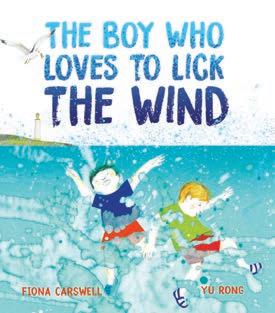
My child’s diagnosis Summer 2024 9

Skydive for autism!
Push yourself out of your comfort zone and test your limits in 2024. By signing up to this once-in-a-lifetime opportunity, you’ll be fundraising to help create a society that works for autistic people and their families.
We’ll provide you with a free National Autistic Society t-shirt to wear on the day and fundraising support to help you reach your target.
Choose from 20 skydive locations across the UK with various dates available.

Scan the QR code for more information on how to register.
a charity registered in England and Wales
and in
by
in
The National Autistic Society is
(269425)
Scotland (SC039427) and also a company limited
guarantee (No.1205298) registered
England. Its registered office is Weston House, 42 Curtain Road, London, EC2A 3NH.
Empowering autistic travel

In April, we launched an ambitious, year-long research project exploring how autistic people experience travel in the UK. Anoushka Pattenden, Research Partnerships and Participation Manager, explains what’s happened so far – and how you can take part
The aim of the ‘Empowering Autistic Travel’ project is to fully understand the barriers that autistic people and their families face in getting from A to B, and to identify workable solutions. This work has been generously funded by the Motability Foundation, which funds, supports, researches and innovates so that all disabled people can make the journeys they choose. The project also ties in with our Moonshot Vision as a really important topic to tackle.
One of our first tasks was to carry out a review of all the research, guidance and personal blogs or vlogs that we could find on the topic. The review highlighted a distinct lack of high-quality, autism-specific information. We also ran an initial ‘snap’ survey to capture some key information around issues that autistic people face when making a journey and the impact this can have. You told us that feeling uncomfortable in crowded spaces, sensory overload and fear of journeys not going to plan were some of the most significant difficulties. You also told us that travelling causes or adds to anxiety, and leads to missed experiences,
opportunities or appointments, meltdowns, exhaustion upon arrival at work or education, and a need for rest and recovery. We plan to use this insight to inform our next steps.
The team wants to capture as many views and experiences of autistic people as possible throughout the project. We are taking a participatory approach, meaning we have established a co-design group of autistic adults who we’ll meet with regularly over the project and discuss key decisions and plans. There are other ways to get involved, too, as well as the survey mentioned in the box below. We have interviews and focus groups planned. We will also be working with transport professionals.
All of this activity will come together to inform realistic recommendations, develop useful guidance and influence positive change. Watch this space for more updates. Get involved and spread the word!
Get involved
Complete our travel survey at smartsurvey.co.uk/s/travelinsight This is open to autistic people, as well as their family and friends.
Read our advice and guidance on transport at autism.org.uk/transport
Research Summer 2024 11
Father and son
Paul writes about Marc’s life, learning to support him, and the journey through fatherhood
In February 1987, my wife and I were excited to prepare for the arrival of our first child. Little did we realise what was about to happen. Our son was delivered by emergency caesarean section following complications that put both our son’s and my wife’s life in danger. After some very intensive hospital care, they both survived, though it would be several

weeks before we could take our son home. Medics expected that he would not survive his first night.
Our son, Marc, had an intraventricular haemorrhage at birth and developed hydrocephalus (a condition in which excess cerebrospinal fluid builds up in the brain). Over the weeks, he underwent specialist brain surgery and was fitted with a shunt. As he recovered from surgery, we were informed that Marc had a right-sided hemiplegia. The right side of his body was weaker and would not develop in the same way as his left. He had no use of his right hand or arm, and a weakness in his right leg, meaning he would need to use a wheelchair for most activities outside our home.
We had to watch as he lay in hospital incubators and cots, displaying agonising distress that was later explained as convulsions. Though Marc screamed with the pain, he did not cry until we arrived home with him for the first time. When he cried then, it was not through pain, but emotion. Those early weeks were filled with so much prayer and hope. Against all expectations, however, we were at home as a family.
As a father, I did grieve over not having the son we had expected – those plans we had for travel and sports were not going to happen. But never once did I regret the son we had. He was a precious gift and a blessing, and we were to learn so much as we supported him over the coming years.
Epilepsy
It was not long before we received the news that Marc had epilepsy – epilepsy, we learned later, that was drug-resistant. This was the cause of his early convulsions. Not only was it drug-resistant, but he was also at high risk of Sudden Unexpected Death in Epilepsy. We needed to consider very carefully what we did and how. The hospital had already cautioned us against Marc playing rugby, football and many other sports because of the potential risk of damaging his shunt. We were even advised not to fly, as the pressure could impact its working and result in pressure build-up in his
12 Your Autism
Real stories
Paul and Marc on the beach
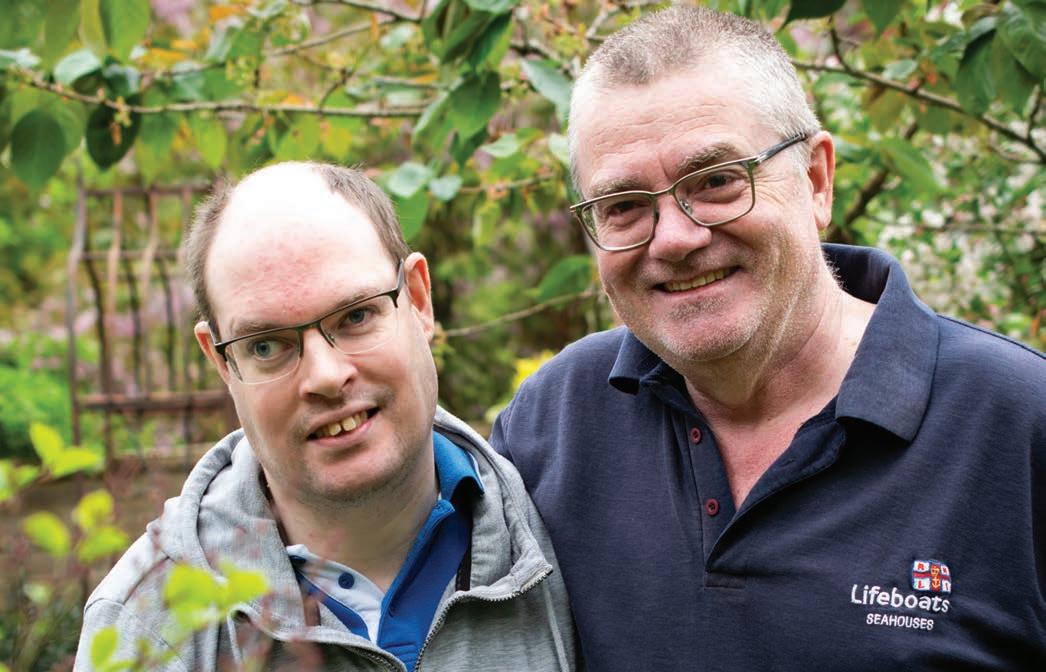
“I started to understand how the world was impacting upon Marc’s senses”

brain. Now, we found we needed to accompany Marc everywhere, in case he should fall during a seizure, which were becoming increasingly frequent.
Throughout Marc’s school years, he attended special educational needs schools because of his physical disabilities; he had been assessed with severe learning disabilities, too. When he reached the end of his educational years, at 19, his mental age was estimated at seven. We also learned that Marc had visual and hearing impairments, and we realised that these contributed so much to his inability to engage with the world. He was becoming very isolated, and I needed to make time to support him in school, developing what we later understood to be coping mechanisms.
Marc was developing intense rage, and we never understood why. He was always so very anxious and was diagnosed with
depression. At the age of 29, Marc was diagnosed as autistic.
Learning about autism
Initially, this diagnosis made no difference. Nothing changed. What did change was my understanding of autism. I researched all I could; I reached out to support organisations in this country and abroad to learn as much as possible to understand and support our son. It was apparent that much of what was written was too generic to apply to our son’s support. I realised that, to help him live as fulfilled a life as possible, I needed to adapt what I learned to his particular needs.
Marc’s rage – or, as I learned later, meltdowns – was my priority. I wanted to enable him to sit for appointments and even go on a day out without displaying an intense and often violent rage. I came across the
Our story Summer 2024 13
Real stories
Marc was diagnosed as autistic at the age of 29

Marc out with his pet dog, Bronte. He also enjoys photography and gardening with Paul, and listening to music
SCARED model of managing meltdowns, and I was relieved to find that, when I applied this structured and preventative approach, Marc was so much more comfortable in situations that were previously so difficult for him. My pride in our son was tangible as he began managing his reactions to various situations. I was starting to understand how the world was impacting upon his senses.
I moved on, looking at supporting his intense need for routine, and realised it was not just doing the same thing at the same time; Marc also needed to have the same thing in the same place. Passing a gift that was in a set place for a while to someone else created a meltdown, as his routine of seeing the same thing in the same place was disrupted. I developed a technique with Marc of growing tomatoes and, as the fruits appeared, I would put them in punnets, explaining these were gifts. The success came from Marc seeing the host plant remain in place, satisfying his sense of routine. I did the same with cuttings, retaining
the host plant and potting the cutting to gift.
I always found that birthdays and Christmas were difficult for Marc. He would become very withdrawn and quiet, often resorting to anger. I eventually realised that it was based on the sudden changes in home decorations and surprise gifts wrapped up. These changes were too sudden, and he could not process the surprise, so he refused them. Now, I’ve learned to set up events like this gradually, so that Marc can come to terms with them more easily. Any surprise gifts are bought and wrapped up together, so he knows there is nothing to fear under that wrapping.
These small successes were huge achievements, though I needed to maintain this level of detailed support, as Marc’s short-term memory is so poor. I learned repetition creates routine, and routine creates acceptance. Together with his other disabilities and conditions, autism was by far the greatest challenge for Marc and our resilience to support him – but also the most rewarding.
As I reflect on where we are today, I regret not understanding Marc’s early years of torment with sensory and cognitive overloads as I do now. If I could travel back in time, I would say to myself, “overcome that youthful arrogance and assumption that I knew all I needed.” I didn’t. I needed to reach out and ask for guidance and help, and not try to do it all alone. I would also tell myself that I should share my experience in bringing up Marc, both good and bad, as that would help others who may be asking the same questions that we were.
Above all, I realise that my son is a blessing to us. Our support of him teaches us so much, and we have learned to see the world in a wonderful way.
Paul has been a member for seven years and is a regular contributor to our ‘Readers to the Rescue’ page. We would like to thank him for his many contributions, and for sharing his considerable knowledge to help others in our membership community.
14 Your Autism
Real stories
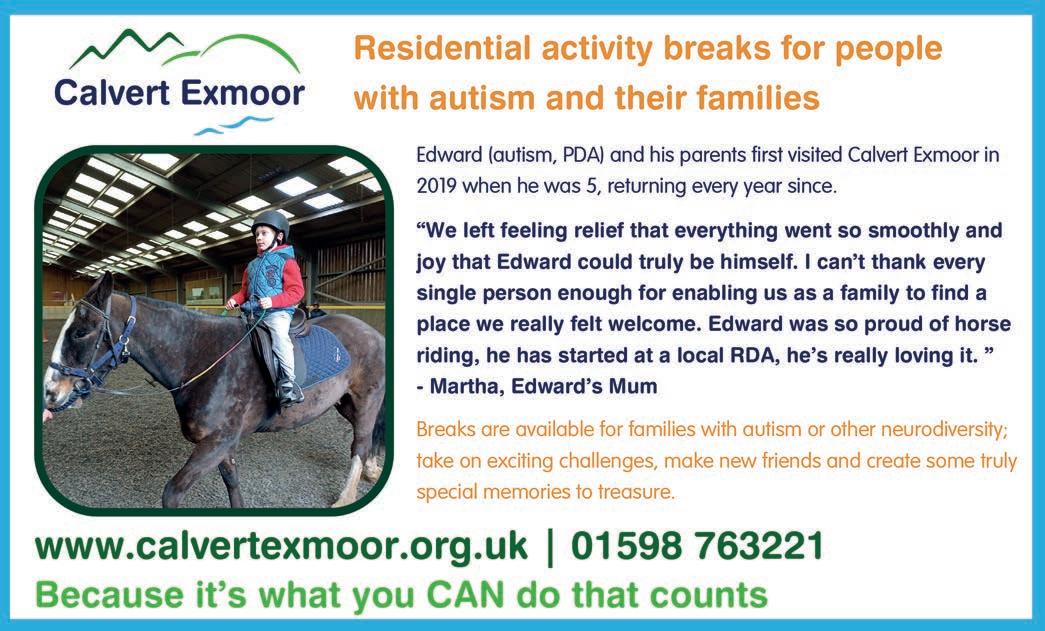
Join Team Autism for the TCS London Marathon 2025!
By joining our team, you will receive:
•a branded National Autistic Society running vest
•a dedicated cheer point for your friends and family to come and support you
•a celebration after the race with hot showers, massages, food and much more!
How to get involved:
If you entered the ballot, results will be announced in July. If successful, we’d love for you to join Team Autism! There is no minimum fundraising target when running with a ballot place.
If you missed the ballot or want to double your chances of running for us, we are still accepting charity place applications. Successful applicants will be asked to pay a £100 registration fee and commit to raising £2,200.


The National Autistic Society is a charity registered in England and Wales (269425) and in Scotland (SC039427) and also a company limited by guarantee (No.1205298) registered in England. Its registered office is Weston House, 42 Curtain Road, London, EC2A 3NH.
Our garden at RHS Chelsea Flower Show 2024
Our charity’s garden, themed around autism and masking, was a huge success at the RHS Chelsea Flower Show on 21-25 May 2024. It was created by co-designers Sophie Parmenter (Sophie Parmenter Studio) and Dido Milne (CSK Architects), and sponsored by Project Giving Back, a charity that provides funding for ‘gardens for good causes’ at Chelsea

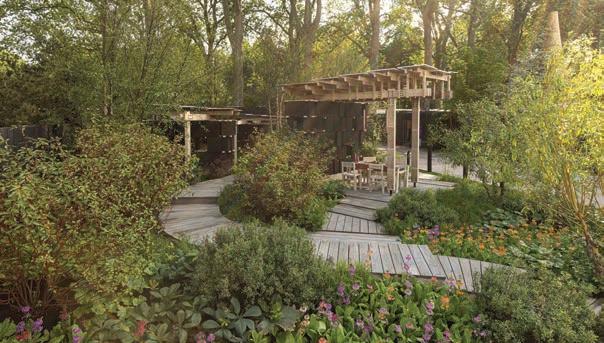


Public understanding 16 Your Autism
Thanks to our sponsorWith special thanks to
Sophie Parmenter and Dido Milne with the garden’s Silver Gilt medal
Ambassador Chris Packham visits the garden
Hear all about the garden from Sophie and Dido in an exclusive event for members on 8 August. See your Members’ enews in July for details.
Photo: Tammy Marler
Photo: Tammy Marler
Explore the garden
Autistic people may experience sensory differences. If you are autistic, you may be over-sensitive or under-sensitive to specific sights, sounds, smells or textures. Our garden has a variety of different sensory experiences.
Touch
The texture of the peeling bark of River Birch (Betula nigra) against the backdrop of the pitted walls of expanded cork and the gnarly texture of Osier Willow (Salix viminalis).
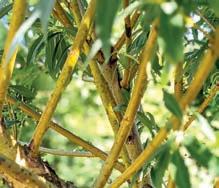

Sound
The construction of the canopy over the family pavilion creates the sound of running water. This water is channelled down a rain chain into a mossy dell at the heart of the garden. Listen also for the rustling of the leaves in the River Birch (Betula nigra).
Sight
The kinetic sculpture, designed by Robert Moore, alludes to the mesmeric beauty and complexity of the mind.

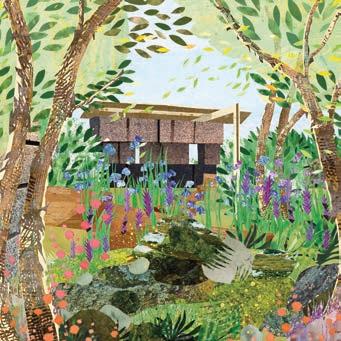


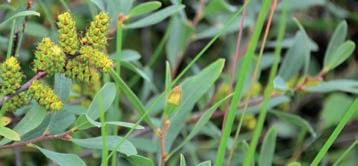
Smell
The herbal scent of Bog Myrtle/ Sweetgale (Myrica gale) in the wetland meadow in front of the family pavilion. Its aromatic leaves can be used like bay leaves and it’s a good nitrogen fixing plant too.

Taste
Although not designed primarily as an edible garden, all our planting and hard landscaping materials are non-toxic.
< Udo (Aralia cordata) – the young shoots can be eaten raw or cooked and are usually blanched to give crisp, lemon-like slices.
Summer 2024 17 For more info and the full plant list, visit autism.org.uk/garden Public understanding
River Birch
Japanese Plum Yew
Osier Willow
Bog Myrtle/ Sweetgale
Our garden represented autistic masking
Masking is a strategy used by some autistic people, consciously or unconsciously, to appear non-autistic in order to blend in and be more accepted in society.
Masking can come at a great cost because it relies on suppressing natural behaviours and coping mechanisms, which can result in exhaustion, mental health difficulties and low self-esteem.
Masking
By Katie

Have you ever tried to scream in a dream and nothing comes out?
Or tried to run but your legs don’t move?
That’s how I feel
Stuck, lost, alone
Too “functioning” for people to understand
Too good at masking to stand out
Where do I go from here?
On the surface, everything is in its place
Like my home
But no-one ever opens the cupboards
I’m tired
Tired of talking
Tired of justifying
Tired of trying to navigate a world full of noise
Why do I have to try so hard?
I wish I could run into a field and scream from the bottom of my lungs
But I’m afraid someone will hear
You don’t see me
I’m a ghost
An imaginary friend
How do I help you understand when you’ve already decided I’m perfect?
So I’ll just carry on
I’ll live alone and work with a smile on my face
I’ll nod and I’ll curtsy
I’ll follow your rules so you feel comfortable
Then I’ll go home and attempt to untie all the knots the day has created
I don’t need help, just understanding
It’s not a lot to ask
Let me be unapologetically me
Let me be free
You assume too much
But you don’t know me
No-one does
Not even myself.
“Trying to identify where I have been masking is difficult, as it has become such an intrinsic part of me now, but masking is draining and ultimately harmful. Just knowing why I do things or feel things the way I do is so empowering”
Francesca
“I knew I didn’t really fit in anywhere, so I became a social chameleon, fitting in everywhere and nowhere, always feeling out of place but never giving that away” Rosalind
For more information on masking, including how to support autistic people who mask, and selfmanagement strategies, visit autism.org.uk/masking
Public understanding 18 Your Autism
Photo: Tammy Marler
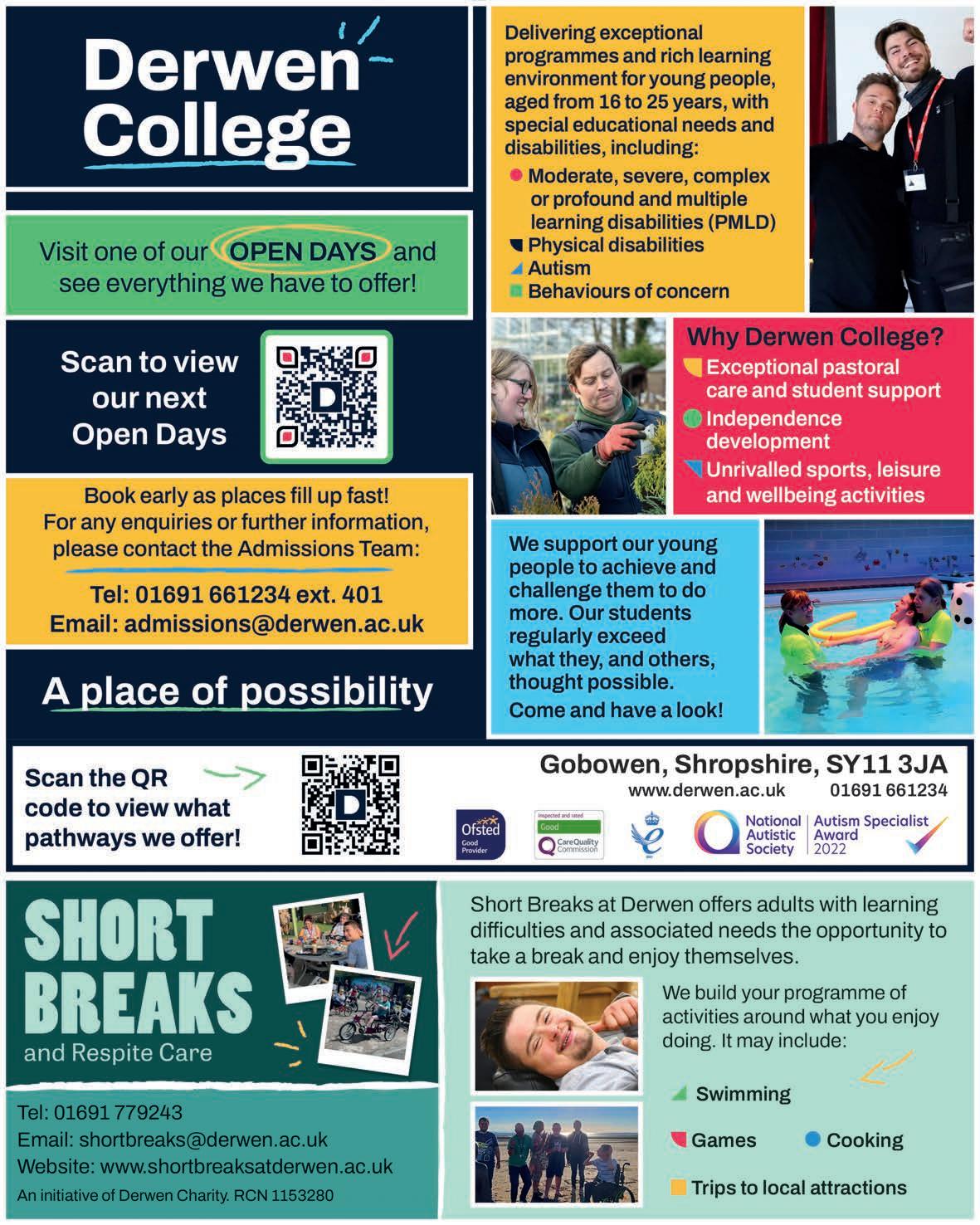
Music for the soul
Dame Stephanie Shirley CH reflects on the benefits of music for autistic people
“Music is the universal language of mankind” – Longfellow
Music is a universal language. It bridges differences and offers a way of expressing oneself that goes beyond mere words. It is a source of order, and of literal and metaphorical harmony. And for individuals with learning disabilities and autism, it can bring solace in a world filled with intense, sometimes painful or incomprehensible, experiences.
You don’t have to know anything about music to enjoy it. You can engage with it as a professional or an amateur, a listener or a performer,
and it will transcend the need for perfection; the delight lies purely in the act of playing or listening, in music’s ability to take people out of themselves, however briefly.
Autism is often associated with uncomfortably heightened sensory experiences, but autistic people can find sanctuary in music. It can soothe an overwhelmed mind or stimulate an otherwise disengaged one. More generally, music nurtures growth, facilitates communication and stimulates creativity.
The relationship between music on the one hand, and learning

disabilities and autism on the other, is a profound one. Some of the most brilliant and talented musicians of the past were neurodivergent, and many autistic people today have tremendous musical gifts. They may have exceptional skills, such as perfect pitch or the ability to memorise and reproduce a piece heard only once – skills that are perhaps a consequence of an autistic ability to focus profoundly on detail.
Music is vital for emotional expression and sensory engagement, particularly for those who are ‘pre-speech’ or in the early stages of speech development. It offers a structured platform through which to communicate, invaluable for those who are non-verbal. It speaks to our souls and minds, irrespective of our abilities.
Research has shown it also has a positive effect on cognitive development and memory retention. Rhythm, melody and movement open new pathways for processing information and expressing oneself. Making music can showcase a person’s potential, regardless of their apparent capabilities.
It can also serve as a bridge by which to make contact with others. Making or listening to music is often a communal activity, which unites people in creation, performance and contemplation. Immersion in music making and listening fosters interaction, which helps cultivate
20 Your Autism
Music
Dame Stephanie founded Music for Autism more than 25 years ago
Photo: Robert Taylor

social skills and a sense of belonging, and, ultimately, boosts self-esteem.
Emotional expression
Music is also an aid to emotional expression for those who find it hard to access or articulate their deeper feelings. Neuroscientists highlight the intricate engagement that music fosters across different regions of the brain, particularly those linked to emotion, memory and movement.
Neurodivergent people can benefit from the fact that musical memory pre-dates and outlasts verbal memory – which is why a melody that tugs at your heartstrings or a song that reignites cherished memories can be so powerful. Those on the autism spectrum can help teach the rest of us to listen with our hearts.
More than 25 years ago, I cofounded the charity Music for Autism, associated with the Orchestra of St John’s. It provides opportunities for autistic individuals to experience and
enjoy music, starting with learning to appreciate a set of songs. Music becomes a powerful tool, helping them connect with the world on their terms.
Other organisations provide support as well, including: The Amber Trust, which supports visually impaired children with their musical development and education; Nordoff and Robbins, whose music therapists seek to change not only individuals but also wider society; Drake Music, which helps disabled people make music; and Autism Angels. My son Giles, like many on the spectrum,
found comfort in repetitive listening. His journey from nursery rhymes to pop, and the emotional impact that certain songs had on him, emphasise how music can be a powerful force for everyone.
Thanks to modern technology, we can make music an integral part of everyday life. We should embrace and make use of that.
Music can change individuals, can indeed change the world. Let us, in the words of the old commercial, teach the world to sing, and draw autistic people into a world of perfect harmony.
Many of our centres offer music activities. Find out more at autism.org.uk/what-we-do/support-inthe-community/centres
Read our article about music therapy at autism.org. uk/advice-and-guidance/professional-practice/ music-therapy
Dame Stephanie’s memoir, Let it go, is available from www.steveshirley.com
Summer 2024 21 Music
“We swapped a rabbit in a hat for a monster under the bed”
Part of an award-winning theatre act, Charlotte Alnwick talks magic, the Edinburgh Fringe and autistic creativity. Interview by Helen Wilson
Tell us a bit about what you do I co-create and develop fringe theatre performances that use magic and illusion to tell stories, recently exploring horror. My brother, David Alnwick, is the performer, and I do a bunch of offstage support during shows, too. I like to joke we are the Billie Eilish and Finneas of magic.
When did you find out you were autistic?
I was diagnosed this year. I was always aware of a difference, but autism was presented as something entirely different from my experiences in the media. A friend who was too hilarious to fit the “autistic people don’t get jokes” myth made me consider autism. We had too many similarities. He was the first person I talked to about it.
What has a dual diagnosis of autism and ADHD meant for you?
It’s removed some personal feelings of failure, although I am not great at

conveying my differences with others. I decided to try to unmask, then immediately remembered why I was so dedicated to it. I’ll be cheeky and say I feel this says less about autistic and ADHD people and more about everyone else. Maybe I’ll strike a balance eventually.
Do you think being diagnosed earlier would have helped you?
Absolutely. We can try to prevent this for the next generation, but I can’t change my past. I often wonder if I had been diagnosed earlier, would I have been homeschooled? Would certain events have happened differently?
I think I would have continued acting – that’s my one regret I’ll admit to. If I’d had an earlier diagnosis and been shown neurodivergent role models within this industry, it would have felt like a more attainable goal.
There are things I wouldn’t want to change. Experience has

value, so for the most part, I feel it was all an education.
What drew you and your brother to magic and theatre?
I can’t remember a time when David wasn’t doing magic. I had zero interest as a kid. Initially, David was doing comedy magic shows and needed help at the Edinburgh Fringe. I hated the job I had, so I swapped.
We both obsess over TV, film and theatre, and we enable each other to be creative. After the loss of our grandfather to Alzheimer’s, David decided to create something that used magic to tell a story, explore emotions and pay tribute to his adventurous spirit. From there, we decided to Frankenstein genres and
Work 22
Your Autism

arts together until we were creating occult illusion and horror theatre shows. Our show, The Mystery of Dracula, has a complex, twisting narrative. It reminds me of the research rabbit holes I find myself in at 3am. Fans of classic horror and video essays especially love it.
Our new show, Necromancer, was an opportunity to throw out a bunch of ideas inspired by grief, loss, inertia, depression and anxiety, to create a space where we could put other people just outside of their comfort zone. It’s ever-evolving and takes inspiration from the video board game Atmosphere and 90s core analogue horror.
Neither are for the faint of heart. I think as magic’s popularity and exposure rose, we sought to destroy

the genre and build something new. We swapped a rabbit in a hat for a monster under the bed.
Has it been hard to establish yourself in the performing arts industry?
It’s hard for many people, but being a working-class Geordie in an occasionally elitist industry isn’t a boon. Being autistic in a social industry can pose challenges, but I think the top prize goes to people assuming I’m someone’s girlfriend, or else just standing around because of my gender.
“People assume I’m in David’s shadow, but I’m literally shining a light on him when running tech”
assume I’m in his shadow, but I’m literally shining a light on him when I’m running tech.
I think professionals can overlook my contributions for those reasons, and because I’m not performing. I don’t perform, primarily because of my challenges as an autistic person. Even though my name’s on the poster, and I’m usually namedropped every show, reviewers write about the shows as if I wasn’t part of the whole process.
A few times, audience members have actually said to me: “It must be difficult for you being his sister when he’s up on stage.” They seem to >
Despite the challenges, the differences benefit us. I think there’s a rather outdated magician vibe that
Summer 2024 23 Work
Photo: Barten Chase


“My mission is to make audience participation safer and more fun for women”




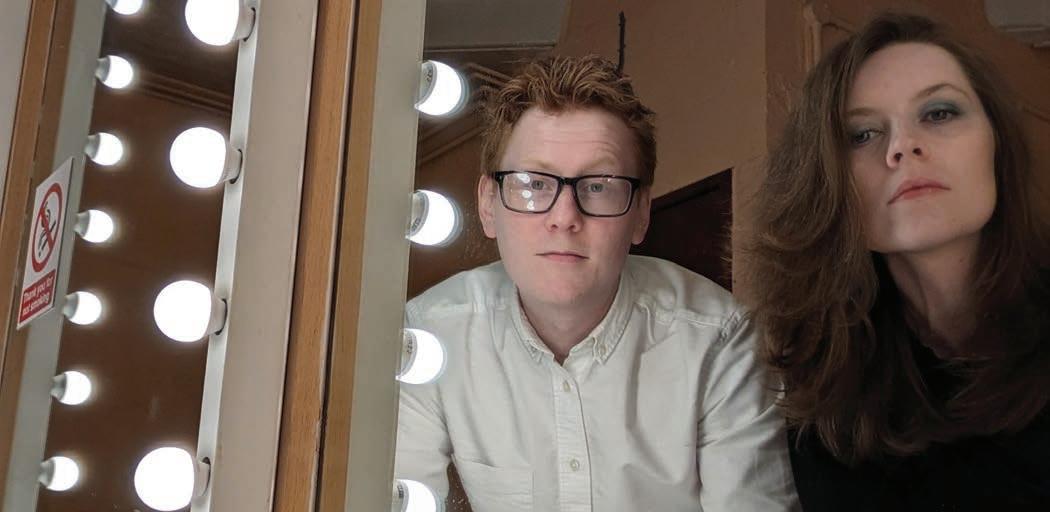
I find creepy, and I’ve made it my mission to make audience participation safer and more fun for women.
I’m always keen to encourage other women and non-binary folks to take part. I’ve noticed a number of autistic people have a keen interest in magic, so I feel proud my brother and I have created a place where they can explore their interests.
What’s the most challenging part?
The social aspect can be daunting, especially when you work as a team. You aren’t only representing yourself, but someone else, too. Moving venue to venue means different staff teams, and I have to adapt. Month-long events such as the Edinburgh Fringe are exhausting and burn you out.
Otherwise, I cannot self-start. My executive function is dysfunction. I’m also bad at middles and ends,
actually – I have a lot of halffinished scripts sitting around.
How does being autistic help you express yourself creatively?
I’ve always spent a lot of time in my head. I have a very vivid imagination. People mistake that for living in a fantasy world where everything goes your way, but I don’t think that would be very good storytelling. I use it to write and direct every idea I have, like cartoons, TV and graphic novels. Getting them into the real world is the biggest challenge.
TV and film are my special interests, and I’m loading all of that information into my head to make it a supercomputer. At least, that’s what I tell myself when I watch a whole season of a show in one day.

What advice would you give to other autistic people looking to break into the arts?
There’s potential to be your own boss. The Free Fringe, a free show organisation with optional donations at the festival, is a great opportunity. It’s a better financial option and a diverse community, including a number of autistic performers. It’s a better deal for audiences, too.
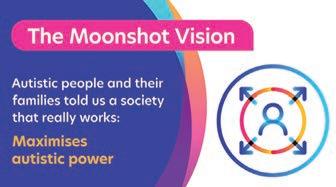
Follow @charlotte.alnwick on Instagram
you like to be interviewed about your job or volunteering role? Email YourAutismMag@nas.org.uk Work 24 Your Autism
Would






Technology That Meets The Need
Technology is central to our lives, helping us communicate and connect with the world and people around us. The new Samsung Galaxy Tab A9 Easology Tablet has been specially developed to make technology more accessible and enjoyable. The unique easology interface fosters a relaxed and calm user experience. With simplified navigation, intuitive information layouts, and text and icons that are clear and easy to read and select, this tablet enables all of us to engage with and enjoy technology.
And while this tablet is especially designed to create a restful and more intuitive experience, it is very much
state-of-the-art with a sharp 8.7” immersive bright screen, a sleek smooth metal body, fast OctaCore processing, 64GB of storage, and Dolby surround speakers. This tablet lets you do everything you want and makes it fun too. So, sit back, relax, and browse the internet, watch videos, engage in social media, download apps, or check your email. And if you need any help, our friendly easology customer service agents are on hand to help and support (yes, real people!).
The Samsung Galaxy Tab A9 Easology 64GB WiFi Tablet is exclusively available online from EE, the UK’s best network. Limited Time Offer, £219.00.
SPECIFICATIONS
WiFi & Bluetooth Enabled
Lightweight & Portable
Large 64GB Storage
Add Storage with a MicroSD Card
Front (2MP) & Rear (8MP) Camera
Headphone Jack

EXCLUSIVELY AVAILABLE FROM EE, THEUK’S BEST NETWORK. Order online at easology.shop/ee ® ® 2 FREE Delivery 2-Year Warranty Customer Support
8.7” Touchscreen
Explore the new intuitive, easy-to-use Samsung Galaxy Tab A9 Easology 64GB WIFI Tablet.






Wired for sound
Ever wanted to customise podcasts and the sound on TV according to your needs?
Samera Haynes introduces the ‘Accessible audio for autistic individuals’ project
It was 2020 – lockdown year – and you either started baking or created a podcast. As a parent trainer with Greater Manchester Autism Consortium, I thought perhaps a podcast would reach parents we didn’t ordinarily see at our face-to-face training.
Because many parents of autistic children are autistic too, I wanted to be mindful of what accessibility features I should consider for a neurodivergent audience. So, I attended the BBC Sounds Amazing Festival, where Dr Lauren Ward, of York University, spoke about providing D/deaf audiences with personalisable content for an episode of Casualty. I asked her whether there was similar research for autistic audiences. Apparently there was not, so we joined forces and the ‘Accessible audio for autistic individuals’ project (A3i) was born.
We had several aims: to address this gap in knowledge – exploring how autistic individuals use existing services and offering technological recommendations; to determine whether


sufficient content information is provided by broadcasters to allow informed choice; and for producers to know what audio-visual sensory experiences autistic people seek out or avoid.
With a panel of autistic adults, we created a 60-question survey and invited neurodivergent participants, including National Autistic Society members, to complete it. More than 68 per cent identified with at least two neurotypes, the most common additional neurotype being ADHD/ADD.
Using subtitles
Phase one of the project showed that 65 per cent of participants use subtitles. However, only 11 per cent of these were hard of hearing, meaning that a greater proportion of subtitle users are those who are autistic and/or have ADHD. While subtitle usage has been expanding, the guidelines need to be updated to cater for neurodivergent as well as hard of hearing viewers. As a result, we have recommended a review of the guidelines.
As can be seen from the word cloud (Figure 1), the larger the word, the more frequently the term was used, with ‘understand’ being the most common reason for using subtitles. We categorised the results under
26 Your Autism
Research


three main themes: ‘following and focusing’; ‘reducing sensory overload’; and ‘reducing cognitive load’. Subtitles allow audiences to follow a plot, and assist with concentration and understanding speech, particularly fast speech, strong accents and foreign language films. Depending on someone’s mood and/or energy levels, subtitles allow a reduction in listening effort and help if the programme has poor sound quality. When there are distractions, subtitles can be a second source of information.
Likes and dislikes
We asked participants what auditory experiences they seek out or avoid (Figure 2). We need to offer choice, as some respondents want content that’s ‘quiet and simple’, while others want ‘something that is big and immersive that I can actually lose myself in’. What autistic individuals seem to avoid in media is largely the same as for those who can hear. The topics highlighted in green (Figure 3) are those that have been previously identified in research as being problematic or unpleasant for hearing viewers. Many of these aren’t accessibility issues per se, but problems for everyone that the industry needs to address.
Key messages for content creators
Lauren and I presented our results at the annual Radio Tech Conference at the Institution of Engineering and Technology. We started by highlighting that 20 per cent of the UK and global population are neurodivergent and would benefit from accessibility features in audio-visual content. If the industry adopted new research and features, it would gain a larger audience and consumers would have greater choice – a win-win situation. Industry insiders and producers were keen to see how they could make their content more accessible, and were interested in the technology to do this.
Our key messages for content creators: Give clear and searchable information about content, including genre, plot, subtitles, ratings and content warnings, to allow the autistic
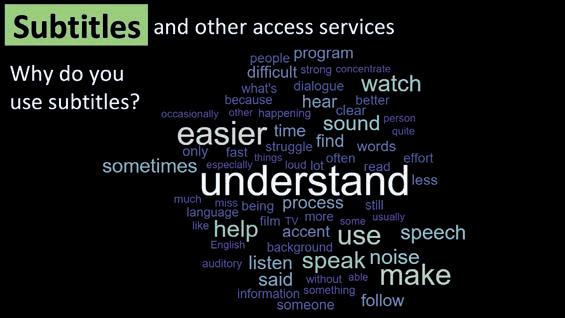


Summer 2024 27
Research
Figure 1
Figure 2
Figure 3














audience to manage their energy and expectations of what a programme is about, how long it is, and whether it’s had good reviews. Our recommendations include ensuring information has a good readability score, using plain English, and, if possible, an easy-read version.
Support your audio with written word. Some autistic people process the written word faster than audio, so transcripts allow them to keep up with a programme. Some like to print the transcript and read it alongside a broadcast.


Signpost audiences to live captioning if your platform doesn’t provide it. Use closed captions if possible. These can be toggled on and off, offering choice, as some autistic people like them, but others find them distracting.
Good production values are good accessibility values. For example, ensure dialogue doesn’t overlap. Minimise clicks, pops and unwarranted or unexpected background sounds.
Give your audience as much choice as possible. Some people like listening more slowly, so they have more time to take in the information. Others prefer a faster speed, which ensures they aren’t distracted, and a constant stream of information that keeps them involved.
Applying the results
BBC Research & Development (R&D) has created the ‘adaptive podcast app’ and York University created the A3i accessibility features. My podcast was then used to test the York version of the app. It was clear some autistic people want to hear a podcast but not the












‘small talk’, while others may not have the energy to listen to a whole podcast. The ‘time squeeze importance’ feature allows listeners the choice of hearing the full podcast, a short version or just highlights.
I was a chartered software engineer before becoming a carer for my autistic son. My company, Frank Communications, has now partnered with BBC R&D to include accessibility features into a working editor that producers can use to create podcasts. We aim to convert our autism podcast series into an accessible form using this new technology. We have created transcripts for each episode of my ‘Quirky and autistic parenting’ podcast. Apple also introduced transcripts in April; it’s great to see the industry addressing accessibility. At York, phase two of the project allowed us to capture information from 50 neurotypical and 25 neurodivergent participants, the latter being more ethnically diverse and/or older. The A3i project paper will be published later in the year.

Series one of Samera’s podcast is called ‘The shape of family’, and Series two, ‘Pride not prejudice’, shines a light on less-publicised aspects of autism. They have had more than 10,000 downloads. Listen and download the transcripts at frankcommunications.org.uk/listen



28 Your Autism
Research







Online autism training


Our online courses have been created to fit into busy schedules. They include:
• Understanding autism

• Finding employment FREE module
• Autism and sensory experience, and many more.

The National Autistic Society is a charity registered in England and Wales (269425) and in Scotland (SC039427)


autism.org.uk/online-training Scan the QR code for all courses
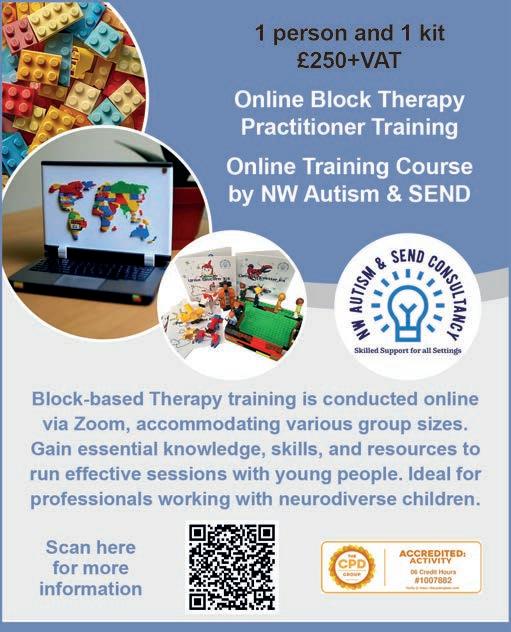
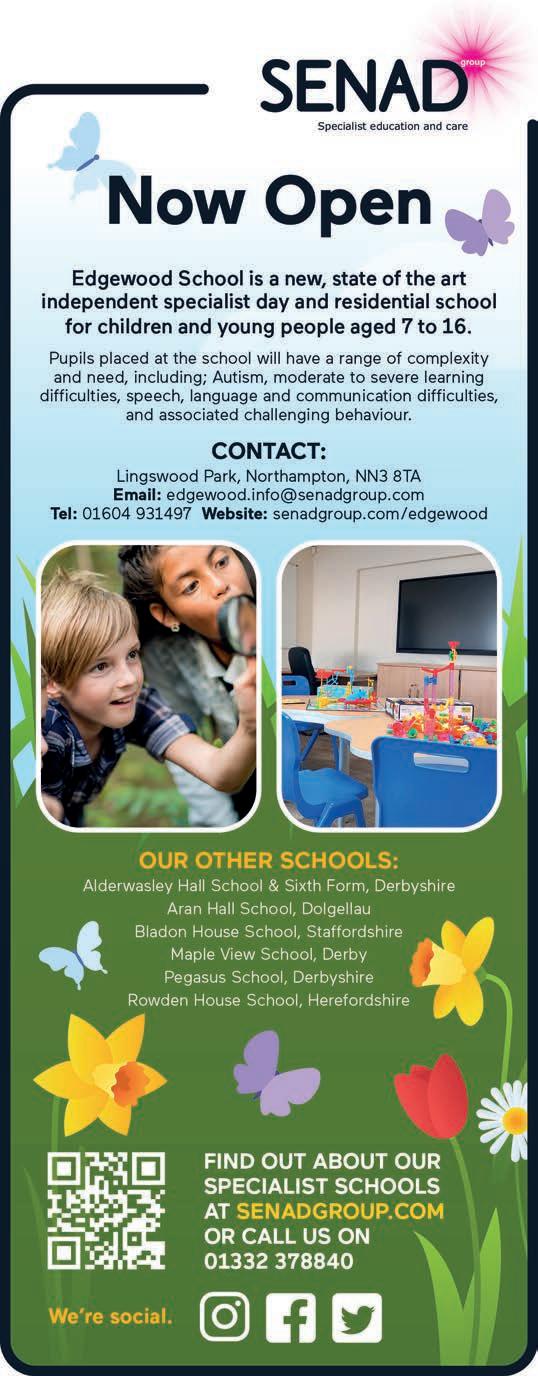
Readers to the rescue!
Do you have an issue our readers can help with? Get in touch and benefit from the experience of your fellow members
QI’m trying to find out what happens when my son leaves residential accommodation at the age of 19. There seem to be very few options for the right sort of care, close to home. Can anyone advise? Liz
AIf your son needs extra support to live independently, or needs social care on leaving residential accommodation, you may like to request a social care assessment for him. You can find more information about different support options, requesting assessments and how to pay for care on the social care section of our website(autism.org.uk/ advice-and-guidance/topics/ social-care). If you live in England, you may find our ‘chat bot’ function helpful; this can be accessed by clicking on our logo in the bottom right-hand corner of the social care section of the website. If you are struggling to find care services, contact your local authority or trust. These can provide a list of care homes in your area and tell you which ones are within their budget if they are paying towards the cost, or within the budget of the person you look after if they are paying for a place themselves. You can find out more by visiting Carers UK(carersuk. org/help-and-advice/practical-support/arrangingcare-and-support-for-someone/residential-care).
For extensive information and guidance about autism, visit our website: autism.org.uk
Post your problems or answers on Facebook at the National Autistic Society members’ group or email YourAutismMag@nas.org.uk

You may also like to search our Autism Services Directory (autism.org.uk/autism-services-directory). This directory holds details of service providers, day services and domiciliary services that have highlighted themselves to our charity.
Suzanne, Autism Help Advisor, National Autistic Society
Help me next!
I tried to get life insurance and was denied recently. Is it harder or more expensive for autistic people to get life insurance? Can anyone share their experiences and advice please? Helen
Send us your solutions for a chance to win an autism-related book of your choice.

30 Your Autism
By writing to us with either a problem or an answer, you give consent for your letter to be published. We reserve the right to edit submissions. iStock.com/ South_agency
Your Autism

Top tips… for enjoying a music festival

If you love live music but struggle with crowds and queues, how do you navigate a music festival?
Avid festival-goer S gives her tips
I go to Bloodstock, the biggest metal festival in the UK. Personally, I quite enjoy the festival environment, but I can see some things that would challenge other autistic people.
Noise
I find the level of noise, the sort of ‘wall of noise’ experience, quite comfortable and actually enjoyable. But some autistic people might find that disconcerting. Temporary
hearing loss could be particularly difficult for autistic people if you’re not wearing good enough ear protection. You might enjoy the sound at the time, but, afterwards, your ears will be ringing and you’ll find it more difficult to hear other people. I have a difficult time distinguishing words from each other anyway, which I know a lot of autistic people have, too. I would mitigate that by getting appropriate ear
Advice 32 Your Autism
“You have a common interest with everyone at the festival, so don’t be put off talking to people”
protection. You can get some high-quality stuff that moulds to your ears so it won’t interfere with the sound quality.
Touch
At the kind of festivals I like, there tends to be a lot of moshing [pushing into each other], so touch is going to be a massive thing. Even just being in a crowded arena might be challenging, let alone being in a mosh pit. Personally, I find that okay – I’d prefer someone not to gently nudge me, but being battered in a mosh pit is fine!
If you struggle with crowded places, aim for outdoor rather than indoor festivals. At an event such as Bloodstock, you might find it more comfortable in one of the larger open-space arenas because, in the small arenas, you might be forced to make physical contact with people you don’t want to.
If you’re in an outdoor space, you can just stand at the back quite happily and you won’t have to touch anybody. If I’m feeling a bit tired and overwhelmed, I might stand towards the back so that, if I want a break, I can get out quickly.
Hygiene
The lack of hygiene and access to personal care items can be
particularly challenging if you have sensory difficulties. Being in your three-day-old clothes coated in sweat and vomit is not a pleasant experience! Have a hygiene plan and bring wipes and spare clothes. Figure out where the showers are and if you would like a shower, go at an odd time, such as in the middle of the night. It will be less busy then.
Plan
Communication
Definitely scope out the facilities in advance. Bloodstock has a quiet camping area if you want a good night’s sleep.
Larger festivals will have that information on the website. Smaller festivals have Facebook groups where you can ask questions about the event. Warhorns, a smaller festival I go to, has Facebook chats where everyone’s very nice and accommodating.
Social stuff
It can be challenging, socially, in these situations – especially if, like
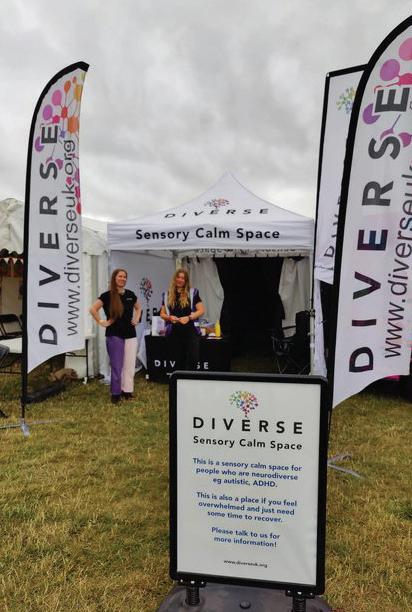
me, you don’t have a lot of people in your life who are into the same things. I go to Bloodstock with friends, but have gone to smaller festivals on my own.
Remember that you have a common interest with absolutely everyone at that festival. So don’t be put off talking to people; you’re all there for the same reason. Try to use it as a way to strike up conversations and make friends.
People tend to be very accommodating and kind to those who have the same interests as them – and if you’re into metal, you should go to a metal festival, because they’re particularly lovely people.

Did you know…
… there will be sensory calm tents at many of this year’s summer festivals, including Glastonbury, Leeds, Reading and Boardmasters. Run by Diverse UK, autistic festival-goers can recharge in the tent with bean bags, soft lights, weighted blankets and ear defenders. Autistic volunteers are on hand to help. It’s a fantastic place to go if you become overwhelmed. Read more at diverseuk.org/sensorycalm-space
Summer 2024 33 Advice
Planning a transition from mainstream school
Suzanne Macleod, our Autism Help Advisor, explains how to plan your child’s transition from mainstream school to the next stage in their life, and manage any anxiety
For many young people and their parents, post-school transition can be a challenging and stressful time. Across the UK, there are duties on schools, local authorities and education authorities to help young people in need of support to prepare to leave school. These are often called transition planning duties.
What are the transition planning timescales?
England: Transition planning should start in Year 9. If a young person has an education, health and care (EHC) plan, the annual review of the EHC plan in Year 9 and after must include planning to transition to adulthood. If a young person does not have an EHC plan, the process should still begin in Year 9, but the planning and review process may be less formal.
Scotland: At least 12 months before a young person is due to leave school, their local authority must gather information that will help them prepare for this and share it at least six months prior to leaving.
Wales: Transition planning for young people in Wales should start in Year 9, 10 or 11, depending on the transition circumstances.
Northern Ireland: For young people with a statement of special educational needs, the Education Authority (EA) must create a Transition Plan following the first annual review after their 14th birthday. There is no requirement to prepare a Transition Plan for those without a statement, but the EA and the school should seek to provide appropriate help and guidance.
Who is involved in transition planning?
This depends on the type of support a young person needs, both in and out of school.
Planning should have the young person at the centre of the process, even if they are unable to be fully involved in discussions. Parents and carers should also be involved because of their unique knowledge and understanding of their child. Examples of the professionals involved include:
● school staff
● social worker
● health professionals (such as psychologist or occupational therapist).

Transition planning tips
It is useful to:
● ask for time to process the information
● remember that it is the young person’s decision
● have regular transition-planning meetings
● list the young person’s likes, strengths, challenges and needs
● use communication aids to help the young person express their views
● know that parents or carers can communicate views on behalf of the young person
Advice 34 Your Autism
iStock.com/FatCamera

● consider a professional advocacy service to collate and relay the young person’s views. Local advocacy services can be found in our Autism Services
Directory: autism.org.uk/autismservices-directory
What options are available for young people leaving school?
Young people should be given an idea of the options that may be available to them and offered information to help them make an informed decision about their future.
Options can include:
● going to college
● applying to university
● applying for day opportunities
● looking for a job or apprenticeship
● volunteering opportunities
● moving to their own home, supported living or residential accommodation.
Your National Careers Service should be able to offer advice about the kind of career or training that may be suitable. The young person may be able to speak to a careers advisor at school or can contact an advisor
“For many young people and their parents, postschool transition can be a stressful time”
outside school to discuss options. Careers services by nation are:
England: National Careers Service nationalcareers.service.gov.uk
Scotland: Skills Development
Scotland myworldofwork.co.uk
Wales: Careers Wales careerswales. gov.wales
Northern Ireland: Careers Service nidirect.gov.uk/campaigns/careers
Summer 2024 35 Advice

As well as deciding on the type of education provider, workplace or support provision that may be suitable, consideration should be given to the environment, social opportunities, travel required and the potential to live independently.
Familiarisation with the new environment
Opportunities to visit the new setting beforehand should be provided to increase familiarity and reduce stress and anxiety. This can include:
● student taster or open days
● parent/carer-student visits to the new college, home or student accommodation
● time spent with new staff in an informal setting
● visit/tour of the new local area, including important landmarks and facilities
● taking photos of the provision and making voice recordings, to help decide on the most suitable option
● asking questions about the environment, staff training and support, and making notes
● sharing a communication passport.
Individual support
Many young autistic people benefit from one-to-one support when they start in a new setting – for example:
● support staff
● visual timetable of classes
● personalised college/work planner
● personalised map of new setting
● warning of unexpected changes
● personalised curriculum or workload
● homework arrangements
● personal workspace
● quiet space
● life-skills training – eg, money management and travel skills.
The process for requesting this support will vary depending on the type of provision or setting to which a young person chooses to go.
Support for students is provided through Disabled Students
Allowance or the education provider; in employment, it is through the employer or funding such as Access to Work; in a residential or day
service, their needs should be assessed through social work.
Managing anxiety throughout transition
Many young people experience anxiety during the transition from school. Strategies to help should be considered. For example:
● professionals should provide clear steps about what will happen during the transition
● ask for specific timescales
● request opportunities to visit possible future provision
● keep a record of visits (notes, photos, videos)
● request to meet key people
● use sensory aids that are calming
● take a break when needed
● use apps or other digital tools for mindfulness and relaxation
● do enjoyable activities throughout the process
● use tools and apps (such as Molehill Mountain, Brain in Hand) to track worries and develop support strategies
● ‘journal’ in written form or by voice recording to help record, organise and process your thoughts
● set regular phone reminders to track your anxiety level
● measure your anxiety on a scale of one to ten and think of ways to bring it down a few points (take a break or do an activity you enjoy).
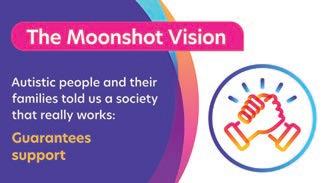
For more information, visit autism.org.uk/transition
Advice 36 Your Autism iStock.com/Disobeyart
































































Summer 2024 37 Advertorial
Getting creative
Students at our Sybil Elgar School have created an astonishing array of murals inspired by nature. Art teacher
Jo Noble tells us more
How did the project start?
I met artist Ashley Davies when I worked in previous SEN schools. Ashley was an art educator at the Courtauld Institute, London, and I had taken my students to visit and take part in her inspiring workshops.
At Sybil Elgar School, we decided to start a project where the pupils would create large murals inspired by nature. Having got MDF board cut to size, Ashley ‘primed’ them, ready for the students to paint on their designs. Over several weeks, the students created colourful designs based on the topic of nature, using techniques such as stencilling, dabbing with a sponge and ‘swoshing’ with a brush.
What have the students enjoyed most?
They loved working on such a large scale... the boards were about 1.5m squared, so it was wonderful for the students to work on such a vast surface. They used acrylic paint, which has a vibrant hue and thicker texture. It is of a much higher quality than the poster paint used in the average art classroom. A lot of our learners have sensory issues, so the majority really enjoyed using these lovely thick paints in bright colours. I think, as well, they enjoyed having the freedom to ‘make their mark’ on the boards. Although the sessions were led by myself and Ashley, we let the students have a lot of freedom to express themselves.
Where will the murals be displayed?
Five will be attached to the walls of the playgrounds and two in the school front garden, on bespoke stands. The two in the front garden are double-sided, so not only can the staff and students enjoy the colourful designs, but passers-by can admire them, too!


Watch our video about this project and find out more about Sybil Elgar School at autism.org.uk/our-schools/sybil-elgar

38 Your Autism
News from our charity



New website resources for you
As part of our ambitious Autism Help programme, we are working on transforming our digital information and support so that we can reach more people and offer guidance on a greater range of subjects. This has been led by our Moonshot Vision and strategic aim of supporting all autistic individuals and their families to live a fulfilled life on their terms.
Over the summer, please visit our website and social media channels for details of new digital resources on: diagnosis; ‘Ask Alice’, the social care chatbot; an upgraded Online Community platform with new features; and – thanks to funding from Autism Central – a more comprehensive and accessible Autism Services Directory to help source local support.
News from our charity
Summer 2024 39
Notebook
Everything you need to read, do or see New! Your recommendations
On the Members’ Facebook group, we asked you to recommend autismrelated books and websites. These are your top choices:












Helping you to identify and understand autism masking: The truth behind the mask by Emma Kendall
“I strongly recommend reading this if you ‘suspect’ your child – in particular, daughter – may be autistic; this book started the process to assessing and diagnosing ours. It’s not a long read.” Clare
Looking after your autistic self: A personalised self-care approach to managing your sensory and emotional wellbeing by Niamh Garvey. Recommended by Al
Happy autistic lady
“One website that I can happily recommend is Happy Autistic Lady. It does bite-sized, themed, positive, informative and colourful articles, alongside selling items to promote positive self-advocacy.” Robin



The jackdaw jungle
AUTHOR: Raina Parker
PUBLISHER: Independently published
PRICE: £4.14 (ebook £1.25)
VERDICT: Moving memoir of a mother and son’s walks to school
Autism, identity and me: A practical workbook and professional guide to empower autistic children and young people aged 10+ by Rebecca Duffus. Recommended by Pea
The guide to good mental health on the autism spectrum by Jeanette Purkis, Dr Emma Goodall and Dr Jane Nugent
“I think this one has lots of useful information and advice.” Lloyd
Join 1,000+ members on our National Autistic Society Members’ Facebook group to exchange tips and advice.
Our member, Raina Parker, has written a beautiful book detailing her son Christian’s walks with her to primary school and all that he observes on the way. She captures how Christian sees the world, including his descriptions of the people, birds and wildlife they encounter together.
A series of lovely moments shared on the way to school, it’s clear that Raina loved this time of day with Christian. She told us: “Christian’s attention to detail is unique, due to his ADHD and autistic brain, and this series of observations helps us see the world through his eyes.”
Suzanne Westbury, Editor of Your Autism
40 Your Autism
Girl unmasked: How uncovering my autism saved my life
AUTHOR: Emily Katy
PUBLISHER: Monoray
PRICE: £13.99 (ebook £11.49)
VERDICT: A powerful account of how the system fails young people with undiagnosed autism
Emily has written with startling candour about the years leading up to her diagnosis. She explains how books and imagination became her refuge as she sought to escape the increasing anxiety and unbearable stresses of school life; her OCD as a teenager; and how a system that did not understand autism let her down.
We see how family and friends became her lifeline and how, after she was diagnosed at 16, Emily came to understand herself and began to turn her life around, eventually becoming a mental health nurse to help others.

“Far too many autistic people – women and girls especially – fly under the radar, unseen and unsupported. Many of us reach crisis point and only then (if we are lucky) do we find out that we are autistic. I hope this book can add to the collection of autistic voices demanding change in how autism is understood and recognised.” Emily Katy
Giveaway
Emily’s memoir makes such an impact because it appears deceptively simple, but it is powerful, inspiring, persuasive and political. It shows how autistic people are missed or mis-diagnosed, time and time again, and the far-reaching impact on their lives and mental health. Suzanne Westbury, Editor of Your Autism
Autism-approved products
We have a copy of Girl unmasked to give away to a member. For a chance to win, please email your name and postal address to YourAutismMag@nas. org.uk by 20 August 2024, putting ‘Unmasked’ in the subject line. The winner of last edition’s giveaway for a copy of Notes for neuro navigators is Sarah Ridout. Congratulations!
Our charity now has a panel of autistic people and their families testing products. The latest product to be awarded autism-approval is:
Gelli Play
Zimpli Kids
Our tester said: “Used it for sensory play. I like how eco-friendly it is and how easy it is to clean.”
A family member tester added: “We really liked that the product had no particular smell, as can sometimes be the case with this type of product.”
Visit zimplikids.com/playtimerange


Summer 2024 41
Notebook
Nice to meet you... Eddie
In a new feature, we’re finding out more about members. First up, long-standing member Eddie writes about his interests and how he sees autism
My name’s Eddie, and I’m a 20-year-old autistic man. My interests are TV shows such as Brum, Art Attack, ChuckleVision, Rosie and Jim, The Forgotten Toys and Scoop (starring Shaun Williamson, who messaged me for my 20th birthday). I like films, including Electric Dreams, Teenage Mutant Ninja Turtles, Abominable, Bean: The Ultimate Disaster Movie, Flashdance and Who Framed Roger Rabbit, and bands such as Talk Talk, Frankie Goes To Hollywood, Toto, The Buggles,
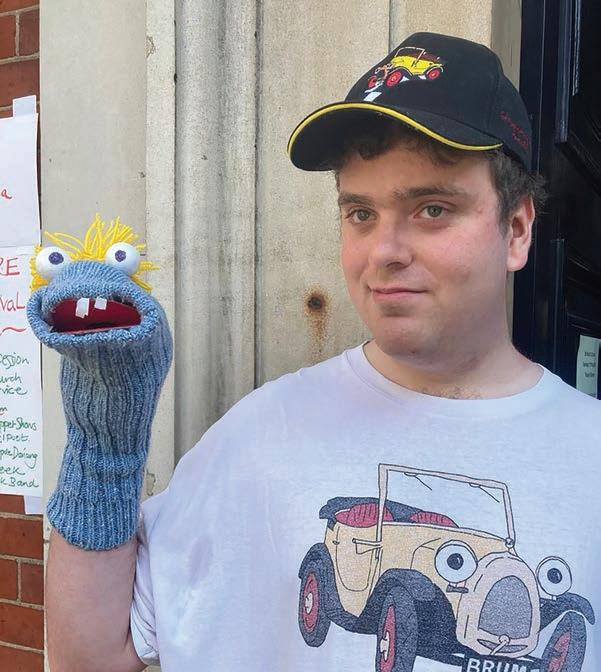
Roxette and the Sub Rosas. I have many more interests, but they’d probably take up the entire magazine!
I don’t give my autism a lot of thought, unless it comes up in conversation. Autism itself, I do give a bit more thought to. It isn’t a disease or a disorder. It’s merely a different neurological wiring. No-one should think any less of you for involuntary things such as autism, Down’s Syndrome, cerebral palsy or whatever birth condition(s) you have. You are only defined by what you decide to do.
Many autistic people, such as Albert Einstein, Isaac Newton, Chris Packham and others, have done great things. There are no boundaries to what we can achieve. Often, as in the case of all three listed people, it’s what interests us that leads to amazing discoveries. So, if you ever feel your interests aren’t going
“You are only defined by what you decide to do”
42 Your Autism
Over to you

to get you anywhere, just remember that all three of these people did research that led to various forms of success, including changing the world and going down in history.
Doing things differently
Autism doesn’t make you better or worse as a person; it just affects certain things such as interactions, senses and understanding people. I tend to be quite shy around people, including those I’ve known my entire life and people I’m very close to.
If you’re reading this and are autistic, or know someone who is, you’ll understand how it is. If I get overly stressed, I often feel the best thing to do is make a list of what I’ve

yet to complete or, depending on how imperative the task is, just unwind. I’ll watch or listen to something that interests me, such as one of the 18 things I listed.
We love hearing from our supporters, and we are keen to share more stories and experiences from our membership community. If you have a story to share, please get in touch by emailing YourAutismMag@nas. org.uk


If you’ve been a member for more than a year, you can now celebrate this milestone with our new, personalised Member Certificate. Celebrate your time with us and your commitment to our shared mission to create a society that works for autistic people.
We know every one of our members has a story, a reason for supporting what we do. If you tag us on social media and share your certificate and reasons for being with us, we’ll reshare your post to honour your inspiring support.
To request your certificate, contact our Membership team at membership. mailbox@nas.org.uk, and they will send it via email.
Summer 2024 43 Over to you

























































































































































































































